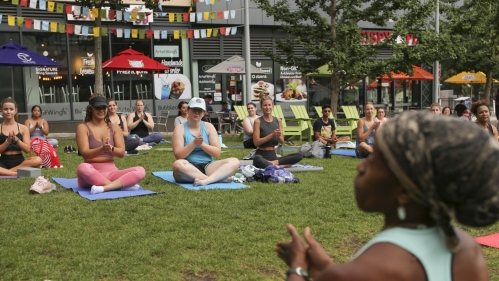
Health and Well-Being
Find a Healthy Balance
Support your body and mind with the many health and well-being resources Rutgers offers. Visit a counselor or clinic, take a break in a wellness space, talk to a nutritionist, or move your body—whatever helps you stay grounded and healthy.
You may hear the phrase “food is medicine” and it’s true. Select a meal plan that works for you and if access to food is limited, we have a student food pantry. Make sure your diet is balanced and nutritious; meet with a nutritionist if you need guidance, and be sure to incorporate exercise into your routine.
Recreational resources at Rutgers are vast. Check out a free class, sport club, sign up for a group workout, or get moving with a friend. From mental health support to fun ways to stay active, there’s something for everyone—and it’s all here to help you thrive.

Explore Resources
Filter
40 Resources
-
Learn More
Attendance is essential for academic engagement and learning. The course syllabus outlines requirements for attendance, deadlines for submission of assignments, and dates of exams. Missing class or the submission of required work can impact your grade, regardless of the circumstances. If you are absent due to an accident, medical, or private matter, you are encouraged to first notify the faculty member or teaching assistant (TA) at the time of the absence or immediately thereafter, as the situation allows.
For a one or two-day absence, use the Student Self-Reporting Absence Application.
For multi-day absences, or when a major course requirement is missed during the one or two-day absence, instructors may request students obtain an Absence and Verification Notice (AVN) from the Dean of Students–Advocacy, Outreach, and Support. Documentation is required for an AVN.
Reporting an absence does not excuse missed work, and even with verification for absences, it is up to each instructor to determine if there are options for allowing the submission of missing or late work.
-
Learn More
Rutgers University is proud to be an Aira Access Partner, providing free visual interpreting services throughout the Rutgers-New Brunswick campus. Any student, staff, faculty, or visitor can use Aira for free on a smartphone simply by downloading the Aira app and connecting with an agent. Learn more about Aira on the Office of Disability Services website.
-
Learn More
Basic needs include, but are not limited to, food, housing, clothing, childcare, mental health, financial resources, and transportation. At some point in a college student's educational journey, they may face challenges in accessing adequate amounts of food, housing, financial, or other resources. This is called basic needs insecurity; millions of college students experience it yearly.
To ensure that basic needs are met for all Rutgers students, on-campus resources and those available in the surrounding community include: food, housing, and utility assistance; emergency aid; mental, physical, and spiritual wellness; internet and technology; child care resources; and faculty and staff resources.
Food and housing insecurity, as well as homelessness, often carry a significant stigma. If someone confides in you about facing these challenges, it's important to respond with compassion and understanding. You can refer them to the Offices of the Dean of Students or the Basic Needs Center at the College Ave Student Center. Students seeking assistance can also complete online forms for emergency grants, textbook/technology assistance, or housing insecurity. Additionally, you can suggest other available resources. Remember, your support and kindness can make a profound difference in someone's life.
We encourage you to also reach out to the Offices of the Dean of Students to share these concerns.
-
Learn More
College life can be very stressful and demanding. The help you need in addressing this stress is just a phone call away. We can assist you in your journey and provide necessary intervention or relief to help you stay on track.
RUEMS has partnered with Residence Life, Student Health Services, and University Behavioral Health Center (UBHC) to provide emergency behavioral and emotional health services to the Rutgers Community.
-
Learn More
Suicide touches us all regardless of ability, age, gender identity, race, socio-economic status, sexual orientation, and more. This 2-hour experiential training aims to increase knowledge about statistics, risk and protective factors, warning signs, and campus resources concerning college student suicide. It will enable participants to demonstrate kindness and empathy towards others, helping them to respond caringly and effectively to those experiencing a wide range of emotional crises. Visit go.rutgers.edu/Campus-Connect for more information, campus-wide training dates, or to schedule a closed session with your group or student organization.
-
Learn More
Students can connect with a community-based counselor for Let’s Talk in person and via phone appointments. Conversations with CAPS (Counseling, ADAP – alcohol and other drug assistance program – and Psychiatric Services) counselors are private and confidential.
- To schedule an appointment, call 848-932-7884 and leave a voicemail with your full name, phone number, and RU ID.
- Please speak slowly and clearly into the phone. Your message will be returned within 1 hour during regular business hours.
- Please note: CAPS will return your call from a blocked number, so please set your phone to allow blocked numbers and set up your voicemail to allow for messages.
Access to and information about other CAPS services is available by calling CAPS at 848-932-7884.
More Resources
Looking for something more specific? Use the search tool above or explore the following categories.
